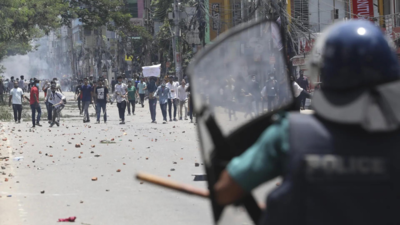
The violence erupted after tensions between rival political factions reached a boiling point. The clashes, initially confined to smaller skirmishes, grew into full-scale confrontations as supporters of the opposing sides took to the streets. Reports indicate that the conflict has spilled over into major urban centers, with substantial damage to property and numerous injuries reported.
Eyewitnesses describe scenes of chaos and destruction, with rioters setting fire to buildings and engaging in violent confrontations with law enforcement. The government has deployed additional security forces to restore order, but efforts have so far been insufficient in quelling the unrest.
Authorities are grappling with the scale of the violence. Emergency services are stretched thin, and there have been widespread reports of shortages in medical supplies and personnel. Hospitals are overwhelmed with casualties, and the humanitarian situation is deteriorating.
The political climate in Bangladesh has been tense for months, with rising dissatisfaction among the populace and allegations of corruption and mismanagement within the ruling administration. The clashes have underscored deep-seated divisions within the country, as political opponents accuse the government of failing to address widespread grievances.
International reactions to the violence have been swift, with several countries and international organizations calling for restraint and urging all parties to engage in dialogue. There have been appeals for an independent investigation into the causes of the clashes and the handling of the situation by authorities.
The situation remains fluid, with ongoing clashes reported in various regions. The government has imposed curfews and restricted movement in affected areas in an attempt to stabilize the situation. Despite these measures, the risk of further violence persists, and many are concerned about the long-term implications for the country's stability.
Human rights organizations have voiced concerns over the use of excessive force by security personnel and the impact on civilian populations. There are calls for accountability and transparency in addressing the aftermath of the violence, including ensuring that those responsible for inciting and perpetrating violence are held accountable.
The broader impact of the violence on Bangladesh's economy and social fabric is yet to be fully assessed. With the country already grappling with economic challenges and social unrest, the current crisis adds another layer of complexity to an already volatile situation.
As the violence continues, the international community watches closely, hoping for a swift resolution and the restoration of peace in Bangladesh. The coming days will be critical in determining whether the situation can be stabilized and if meaningful dialogue can lead to a lasting resolution.
